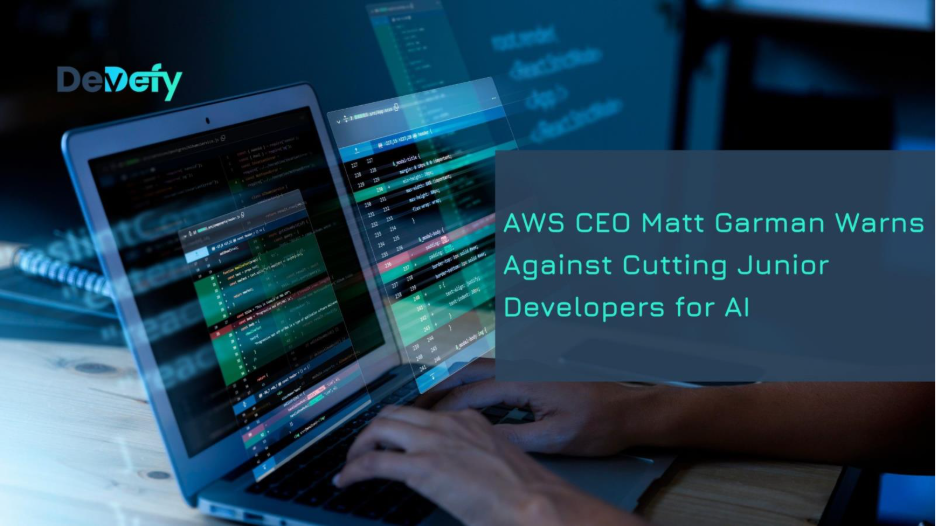
AI and junior developers are at the center of a growing debate as companies question whether artificial intelligence can replace entry-level roles. Amazon Web Services (AWS) CEO Matt Garman has made his stance clear: cutting junior developers in favor of AI is “the dumbest thing I’ve ever heard.”
Garman’s comments came during a recent podcast appearance with Matthew Berman, where the chief exec discussed AWS’s current AI strategy and the technology’s long-term impact on the industry. He emphasized that while AI is a powerful tool, removing junior developers from the equation could leave companies without the skilled senior engineers they’ll need in the future.
The AI wave is crashing over every industry. From customer support bots to AI-powered coding assistants, companies are asking themselves:
Do we really need to hire fresh talent if AI can do the job?
Big Tech has already shifted gears, entry-level hires dropped from 25% in 2023 to just 7% in 2024.
But here’s the problem: AI doesn’t replace growth, mentorship, and creativity.
Without junior software developers, who becomes the next generation of senior engineers, architects, or CTOs?
That’s the exact question Matt Garman raised at AWS.
These aren’t distant headlines, they reflect exactly why frameworks like HIPAA and SOC 2 matter now more than ever.
At a recent podcast, Garman said:
“Replacing junior developers with AI is the dumbest thing I’ve ever heard.”
Why?
Fresh energy: Juniors bring curiosity, new perspectives, and willingness to learn.
Fast learners: Unlike senior engineers who may resist new trends, juniors often experiment with new tools like GitHub Copilot, ChatGPT, or AWS Q Developer.
Team glue: Juniors often step into roles that keep projects moving, such as pair programming, testing, QA, documentation, etc.
One AWS stat makes this clear: over 80% of AWS developers already use AI tools.
Instead of making them redundant, it makes juniors more productive.
Think of AI like a power-up. Without the player (the developer), the game doesn’t even start.
Rather than viewing AI as a substitute for junior talent, Garman suggested it should be seen as a supporting tool.
The lesson is simple: AI amplifies human talent; it doesn’t replace it.
Junior developers, especially those entering the workforce today, are quick to adapt to these tools. They can pair human judgment with machine efficiency, creating better outcomes than either could deliver alone.
Matt Garman predicts a big shift. The role of developers won’t be just writing endless lines of Java or Python. AI will handle more of the repetitive coding, freeing humans to focus on strategy, architecture, and creative problem-solving.
But here’s the catch: this future is only possible if companies keep investing in junior talent. As Garman explained, without fresh developers entering the field, there won’t be anyone to grow into tomorrow’s senior engineers, architects, or CTOs.
For companies like Amazon, that means continuing to nurture junior software developers through programs, mentorship, and hands-on experience. AI may accelerate workflows, but it can’t replace the growth, learning, and leadership pipeline that junior developers bring to the table.
If you’re a business leader, this is the real takeaway:
Cutting out juniors may save you a few bucks today, but it will cost you millions in lost innovation tomorrow.
Hiring junior developers is like planting seeds. Sure, they take time to grow, but they’re the ones who turn into shade-giving trees, your future leads, architects, and managers.
And with AI in the mix, your investment pays off faster. Juniors onboard quicker, deliver quicker, and learn quicker.
At DevDefy, we see this shift every day. Clients ask us: “Do we really need junior developers when AI exists?”
And our answer is: Yes, more than ever.
We help companies:
Want to future-proof your product strategy? Let’s Talk!
Matt Garman isn’t just making a hot take. He’s sounding the alarm for the whole industry.
AI is powerful. But without junior developers, there’s no future workforce. They are cost-effective, AI-native, and essential to building sustainable teams.
So the next time someone says, “Why hire juniors when we have AI?”, remember: That’s not just risky, it’s unsustainable.
